What’s New
Looking for SwaggerHub On-Premise release notes? See here.
This page contains the release notes for features and updates to SwaggerHub.
October 30, 2025
The GitHub Sync integration now supports OpenAPI 3.1 specifications.
The Azure API Management integration no longer supports SAS tokens, following their deprecation by Microsoft. OAuth is now the required authentication method.
October 23, 2025
You can now use AI-powered features to resolve standardization errors in Code Editor. See the Resolve standardization errors documentation for details.
October 17, 2025
SwaggerHub now supports the AsyncAPI 3.0 specification, enabling you to import AsyncAPI 3.0 definitions into your API collection, as well as search, filter and export them. For more details on the available features and current limitations, see the AsyncAPI Support documentation.
October 16, 2025
You can now import Spectral rulesets to create or update your organization's style guides in SwaggerHub. For details, see the Importing Spectral Style Guides documentation.
Registry API improvements:
Added new operations to manage Spectral Style Guide bundles:
GET /standardization/spectral-rulesets/{owner}/{name}/zip PUT /standardization/spectral-rulesets/{owner}/{name}/zipExpanded the list of supported AWS regions.
October 14, 2025
Updated Swagger Editor Alpha to version 5.0.0-alpha.157.
Updated Swagger Editor to version 4.14.8.
Updated Swagger UI to 5.29.4.
Updated Swagger Codegen V2 to version 2.4.48.
Updated Swagger Codegen V3 to version 3.0.75.
Updated Swagger Core v3 to version 2.2.39.
October 6, 2025
With the added Spectral support in SwaggerHub, you can now validate OpenAPI and AsyncAPI definitions against your defined rulesets in real time.
October 3, 2025
A SwaggerHub integration with MCP server is now available. See the SmartBear MCP Server documentation for details.
September 30, 2025
SwaggerHub now enables you to generate MCP server for your APIs. See the Generate MCP Server documentation for details.
September 29, 2025
You can now import GraphQL definitions and display them in your organization's catalog. See the Import GraphQL API Definitions documentation for details.
Updated Swagger Editor Alpha to version 5.0.0-alpha.155.
Updated Swagger UI to 5.29.1.
Updated Swagger Client to version 3.35.7.
September 15, 2025
You can now create or edit custom rules for API standardization using Smartbear AI.
September 9, 2025
Updated Swagger Editor Alpha to version 5.0.0-alpha.153.
Updated Swagger Editor to version 4.14.7.
Updated Swagger UI to 5.29.0.
Updated Swagger Codegen V2 to version 2.4.47.
Updated Swagger Codegen V3 to version 3.0.73.
Updated Swagger Core v3 to version 2.2.37.
September 8, 2025
Code Editor for OpenAPI 3.1 and AsyncAPI is now available in Diff Mode, allowing you to preview the changes to your API against its last saved version.
September 3, 2025
You can now edit OpenAPI 2.0 definitions using Form Editor instead of the legacy Visual Editor, offering you a more user-friendly and structured API design experience.
September 2, 2025
Updated Swagger Editor Alpha to version 5.0.0-alpha.152.
Updated Swagger UI to 5.28.0.
Updated Swagger Codegen V3 to version 3.0.72.
August 19, 2025
Updated Swagger Editor Alpha to version 5.0.0-alpha.150.
Updated Swagger Core v3 to version 2.2.35.
August 14, 2025
You can now import Postman collections, and they’ll be automatically converted to an OpenAPI Specification (OAS). Then, you can seamlessly continue your API design journey by documenting your APIs, creating contracts, or building end-to-end tests.
August 1, 2025
Updated Swagger UI to 5.27.1.
Updated Swagger Core v3 to version 2.2.35.
July 31, 2025
Added support for creating and modifying AsyncAPI definitions using AI-powered features. See the Design with AI documentation for details.
July 16, 2025
Updated Swagger UI to 5.27.
Updated Swagger Codegen V2 to version 2.4.46.
Updated Swagger Codegen V3 to version 3.0.71.
July 7, 2025
Updated Swagger UI to 5.26.2.
Updated Swagger Client to version 3.35.6.
June 18, 2025
Updated Swagger UI to 5.22.2.
Updated Swagger Client to version 3.35.3.
Updated Swagger Codegen V3 to version 3.0.69.
Updated Swagger Core v3 to version 2.2.34.
June 12, 2025
Added support for exporting unresolved definitions in Draft Mode. See the Draft Editor documentation for details.
API definitions updated with AI-based features are now validated against organization's standardization rules.
June 5, 2025
Updated Swagger UI to 5.24.0.
Updated Swagger Editor Alpha to version 5.0.0-alpha.149.
Updated Swagger Client to version 3.35.5.
Updated Swagger Codegen V2 to version 2.4.45.
May 28, 2025
Updated User Management API to version 2.4.0.
May 21, 2025
Added support for commenting in AsyncAPI definitions. See the Comments documentation for details.
Updated Swagger UI to 5.22.0.
Updated Swagger Editor Alpha to version 5.0.0-alpha.147.
Updated Swagger Client to version 3.35.3.
Updated Swagger Core v3 to version 2.2.32.
May 20, 2025
You can now create or modify your APIs using AI-powered features. See the Design with AI documentation for details.
May 15, 2025
We have added support for displaying users’ last activity in the User Management API. The updated Get organization members endpoint now shows each user’s last activity with its date and time, including Read activity.
Get user roles endpoint returns a list of roles a specific user has been assigned for each resource in the organization.
Get resource types endpoint allows you to display a list of all types of resources in the organization.
See the User Management API documentation for details.
May 6, 2025
Updated Swagger Editor to version 4.14.6.
April 24, 2025
Updated Swagger Editor Alpha to version 5.0.0-alpha.139.
Updated Swagger UI to version 5.20.8.
Updated Swagger Core v3 to version 2.2.30.
April 11, 2025
Draft mode: We have introduced a new mode supporting API design. You can now create and modify your APIs as drafts before publishing them to your organization - while still benefitting from access to features such as Form Editor, validation of standardization rules, or import and export options.
See the Draft Editor documentation for details.
April 8, 2025
Updated Swagger Client to version 3.34.4.
Updated Swagger Editor to version 4.14.5.
Updated Swagger Editor Alpha to version 5.0.0-alpha.137.
Updated Swagger UI to version 5.20.2.
Updated Swagger Codegen V3 to version 3.0.68.
Updated Swagger Core v3 to version 2.2.29.
March 24, 2025
Updated Swagger Client to version 3.34.3.
February 11, 2025
Updated Swagger Client to version 3.34.0.
Updated Swagger Codegen V3 to version 3.0.67.
January 7, 2025
Updated Swagger Core v3 to version 2.2.27.
Updated Swagger Codegen V3 to version 3.0.65.
Updated Swagger Codegen V2 to version 2.4.44.
December 17, 2024
Updated Swagger Client to version 3.32.2.
December 4, 2024
Updated Swagger Client to version 3.31.1.
Updated Swagger-Parser to version 1.0.72.
Updated Swagger-Parser v3 to version 2.1.24.
Updated Swagger Core v3 to version 2.2.26.
October 31, 2024
Updated Swagger Client to version 3.29.4.
Updated Swagger Codegen to version 3.0.63.
October 31, 2024
Updated Swagger Client to version 3.29.4.
Updated Swagger Codegen to version 3.0.63.
September 27, 2024
Updated Swagger Editor Alpha to version 5.0.0-alpha.117.
August 14, 2024
Updated Swagger Codegen to version: 3.0.60.
August 10, 2024
Updated Swagger Codegen to version: 3.0.62.
July 31, 2024
New Form Editor: We replaced the Visual Editor with a new Form Editor, offering enhanced capabilities and a streamlined user experience.
SwaggerHub Portal: We superseded Docs Branding with the SwaggerHub Portal. While existing Docs Branding users can continue to use it, new users will be guided towards the SwaggerHub Portal.
Expanded User Management: User management is now available for all plan tiers, providing greater control over user access and permissions.
July 16, 2024
Updated Swagger Codegen to version 3.0.58.
July 1, 2024
Updated Swagger Editor to version 4.13.1.
Updated Swagger Editor Alpha to version 5.0.0-alpha.96.
June 20, 2024
We didn’t add new features for this release. We updated this content to reflect only minor corrections.
June 6, 2024
Updated SwaggerHub Client to version 3.28.1.
Updated Swagger Editor Alpha to version 5.0.0-alpha.95.
Updated SwaggerHub UI to version 5.17.12.
Updated SwaggerHub UI React to version 5.12.12.
Updated Swagger Core v3 to version 2.2.22.
May 10, 2024
Updated SwaggerHub Client to version 3.27.9.
Updated Swagger Editor to version 4.12.2.
Updated SwaggerHub UI to version 5.17.9.
Updated SwaggerHub UI React to version 5.17.9.
May 2, 2024
Updated Swagger-Inflector to version 2.0.12.
Updated Swagger-Inflector v1 to version 1.0.26.
Updated Swagger-Parser to version 1.0.71.
Updated Swagger-Parser v3 to version 2.1.22.
Updated Codgen Templates to version 1.8.0.
Updated Codgen v3 to version 3.0.56.
Updated Codgen to version 2.4.41.
April 8, 2024
Updated SwaggerHub Client to version 3.26.4.
Updated Swagger Editor Alpha to version 5.0.0-alpha.90.
Updated SwaggerHub UI to version 5.12.3.
Updated SwaggerHub UI React to version 5.12.3.
Updated Swagger-Inflector to version 2.0.11.
Updated Swagger-Parser v2 to version 1.0.70.
Updated Swagger Core v2 to version 1.6.14.
Updated Swagger Core v3 to version 2.2.21.
March 25, 2024
Updated SwaggerHub Client to version 3.26.0.
Updated SwaggerHub UI to version 5.11.10.
Updated SwaggerHub UI React to version 5.11.10.
March 11, 2024
Updated SwaggerHub Client to version 3.25.3.
Updated SwaggerHub UI to version 5.11.8.
Updated SwaggerHub UI React to version 5.11.8.
Updated Swagger Codegen to version 3.0.54.
February 26, 2024
Updated Swagger UI to version 5.11.4.
Updated Swagger Editor Alpha to version 5.0.0-alpha.88.
Updated Swagger Client to version 3.25.1.
February 12, 2024
Updated Swagger Core v1 to version 1.6.13.
Updated ApiDOM to version 0.93.0.
January 24, 2024
Updated Swagger Client to version 3.25.0.
Updated Swagger UI to version 5.11.0.
Upgrade Swagger UI React to version 5.11.0.
Updated Swagger Editor to version 4.12.1.
January 10, 2024
Updated Swagger Codegen to version 2.4.39.
Updated Swagger Codegen v3 to version 3.0.52.
Updated Swagger Core v3 to version 2.20.20.
December 18, 2023
Downgrade Swagger UI to version 5.9.3.
Downgrade Swagger UI React to version 5.9.3.
December 4, 2023
Standardization support for OWASP Top Ten security guidelines.
Updated Swagger Codegen v3 to version 3.0.51.
Updated Swagger Codegen to version 2.4.37.
Updated Swagger UI to version 5.10.1.
November 20, 2023
Updated Swagger Core v3 to version 2.2.19.
November 6, 2023
Updated Swagger Client to version 3.23.1.
Updated Swagger Codegen v3 to version 3.0.50.
Updated Swagger UI to version 5.9.1.
October 19, 2023
Support for importing and exporting standardization rules.
Support for Spectral ruleset properties for API Standardization.
Update to organizational role management concerning the SwaggerHub Portal changes.
Updated Swagger Codegen v2 to version 2.4.33.
Updated Swagger Codegen v3 to version 3.0.47.
Updated Apidom to version 0.77.0.
Updated Swagger Client to version 3.23.0.
Updated Swagger Editor to version 4.11.2.
Updated Swagger Editor Alpha to version 5.0.0-alpha.78.
October 05, 2023
Updated Swagger-Inflector to version 1.0.24.
Updated Swagger-Core_v3 to version 2.2.16.
Updated Swagger Client to version 3.22.3.
Updated Swagger Editor to version 4.11.1.
September 21, 2023
Support for TLS v1.3.
August 24, 2023
Updated NodeJS 18 and 16 for AWS Lambda Integration.
Updated Swagger Editor to version 4.10.2.
Updated Swagger Editor Alpha to version 5.0.0-alpha.75.
Updated Swagger UI and Swagger UI React to version 5.4.2.
August 10, 2023
Updated Custom Rules for API Standardization.
July 27, 2023
Updated Custom Rules for API Standardization.
Updated Swagger Client to version 3.19.11.
Updated Swagger Editor Alpha to version 5.0.0-alpha.70.
Updated Swagger UI and Swagger UI React to version 5.2.0.
July 25, 2023
Support for SwaggerHub Explore.
July 14, 2023
Support for OpenAPI 3.1 standard.
July 03, 2023
Updated Swagger Client to version 3.19.10.
Updated Swagger Editor to version 4.10.0.
Updated Swagger Editor Alpha to version 5.0.0-alpha.65.
Updated Swagger UI and Swagger UI React to version 4.19.1.
June 21, 2023
Added the ability to assign roles to a project.
Updated Swagger Codegen to version 3.0.45.
Updated Swagger Core to version 2.2.11.
Updated SwaggerHub plugin for IntelliJ IDEA to support versions 2023.1.1 and 2023.2 IntelliJ Idea
June 01, 2023
Updated Swagger Client to version 3.19.8.
Updated Swagger Editor to version 4.9.2.
Updated Swagger Editor Alpha to version 5.0.0-alpha.64.
Updated Swagger UI and Swagger UI React to version 4.19.0.
May 22, 2023
Updated Swagger Client to version 3.19.7.
Updated Swagger Editor to version 5.0.0-alpha.6.1.
May 03, 2023
April 19, 2023
On the Teams settings page added the ability to add and delete resources.
Updated Codegen to version 3.0.42.
SwaggerHub plugin for IntelliJ IDEA updated to version 2023.1 of IntelliJ IDEA.
April 11, 2023
Added an option on the Organization Settings page Members tab allowing owners to specify that designers can share resources they can access.
Added the Organizational Role column to the Members table in the Organization Settings page Members tab.
Added an option on the Standardization page for an owner to specify if designers can see standardization errors in the editor page.
Updated Swagger Client to version 3.19.5.
Updated Swagger Editor to version 4.9.0.
March 28, 2023
Added Team Resource table to the Teams settings page showing a list of all resources (APIs, domains, projects) that the team has been assigned access to.
February 24, 2023
Updated email notifications:
Designers and Consumers will not receive notifications automatically.
SwaggerHub users who are members of a team will receive all notifications for any APIs or domains assigned to the team.
Standardization rules enabled for AsyncAPI
Standardization custom rules now support JSON path expressions
Updated Swagger Codegen v2 to version 2.4.30
Updated Swagger Codegen v3 to version 3.0.41
February 04, 2023
Changes to user access:.
Members of Teams are now subscribed to notifications about all resources (APIs, domains, templates) that the teams have access to. Learn how to unsubscribe to notifications here.
System-wide permissions have changed, so consumer users may find that their access is more restrictive. Click here for more information about current resource roles.
If you are a collaborator on APIs or domains in SwaggerHub the organization(s) associated with those resources will now appear in the left sidebar. To find the owner of this organization, click here.
Changes to user roles and resource access management:
Editor/Viewer/Commenter collaborator roles have been replaced by Designer/Consumer roles.
Consumers who are members of a team will be upgraded to designers if the team is added to a resource or project with the designer role. If there are insufficient designer license seats available you will not be able to grant the role change to the team.
User billing counts on the Members page have been updated to reflect roles more accurately.
Updated Member Profile page for adding roles to members.
Previously, invited members were assigned a role which used a designer or consumer seat after they accepted their invitation; now invitations automatically take up a seat (i.e., you can't issue more invitations than the limit count in your plan).
Invited users are automatically assigned a consumer role. After sending the invitation, the organization owner can change the assigned role to designer in the organization Member Profile page.
Invitations do not expire. If the user does not accept the invitation, they can be removed from the member list so that their seat can be used for another user. Note that the Resend Invitation icon will only appear with invitees who have not accepted their invitation through the automatic invitation flow.
The system-wide option checkboxes on the Members page have been redone. Users who previously had a consumer role may find that their permissions have changed.
Notifications about all resources (APIs, domains, templates) available to a team are now sent to every member of the team.
Collaborators (users who are not members of teams, with access to specific resources) now appear on the member list in Organization Settings.
All icons in the updated access control screens have tooltips and you can hover over the icon to get a description of the icon's function.
Updated Codegen to 3.0.37
Updated Swagger Core to 2.2.8
January 16, 2023
Support for contract testing with PactFlow for API definitions (OpenAPI 2.0/3.0)
SwaggerHub Integration for Confluence macro - November 22, 2022
November 16, 2022
Updated standardization rules
Changes to custom standardization rule specifications
October 27, 2022
Updated Swagger-editor to 4.4.4
Updated Swagger-ui to 4.15.0
Updated Swagger-editor-next to 5.0.0-alpha.27
SwaggerHub plugin was aligned to new version Intellij IDEA 2022.3
September 29, 2022
Updated Swagger-Generator-V3 to 3.0.35
August 23, 2022
Support for AsyncAPI domains
August 9, 2022
Option to export resolved json/yaml added for AsyncAPI definitions
Updated Swagger Core to v. 2.2.2 for OpenAPI 3.0
Fields on Create New API modal reordered
June 21, 2022
Swagger Editor updated to latest alpha version
Bitbucket integration added for AsyncAPI
June 13, 2022
Support for AsyncAPI when creating, editing and collaborating on API definitions
May 30, 2022
New Code generators for OpenAPI 3.0: Javascript and Nodejs.
May 17, 2022
Updated Swagger UI to v. 4.11.0.
Updated Swagger Editor to v. 4.2.7.
May 3, 2022
Updated Swagger Editor to v. 4.2.3.
Updated Swagger Codegen to v. 3.0.34 for OpenAPI 3.0 and v. 2.4.27 for OpenAPI 2.0.
Updated Swagger Core to v. 2.2.0 for OpenAPI 3.0 and v. 1.6.6 for OpenAPI 2.0.
April 25, 2022
New supported regions in AWS integrations: ap-southeast-3 and ap-northeast-3.
Node12.x and Python3.9 is now available for AWS lambda integrations.
Enable/Disable request validation on API auto-mocking. For Enterprise plans
March 24, 2022
Updated Swagger UI to v. 4.6.2, which improves example generation for string properties and schemas. If a schema defines a regular expression
pattern, the example value will be generated based on this pattern.
Click the image to enlarge it.
Improved the error messages shown when resolved YAML or JSON cannot be generated. The errors now indicate the cause of the problem, such as the name of a domain component that was not found.
Updated Swagger Editor to v. 4.2.0.
March 14, 2022
Version numbers can now include the plus character (+) for compatibility with Semantic Versioning. The new version format is supported when creating versions in the SwaggerHub web applications as well as via CLI, VS Code extension, IntelliJ IDEA add-on, and Registry API.
UX improvement: Links in the SwaggerHub navigation menu and sidebar can now be right-clicked and opened in a new tab or window.
February 22, 2022
SwaggerHub mock server now honors
nullvalues in response and schema examples used in OpenAPI 3.0 definitions. Previously,nullexamples were ignored and not included in mock responses.Updated Swagger Codegen to v. 3.0.33 for OpenAPI 3.0 and v. 2.4.26 for OpenAPI 2.0.
Updated Swagger UI to v. 4.5.0 and Swagger Editor to v. 4.1.2.
February 9, 2022
Updated Swagger Editor to v. 4.0.6, which includes a new validation check for schema properties defined with both
readOnly: trueandwriteOnly: true.Updated Swagger UI to v. 4.4.1.
January 27, 2022
Organizations that use single sign-on (SSO) can now invite external users that are not managed by the organization’s identity provider.
This functionality is available by default for all SSO-enabled organizations. Customers who wish to block external users from being invited can contact Support to have this feature disabled for their organization.
Usernames and the names of organizations, projects, APIs, domains, and versions can now contain multiple consecutive special characters. For example, multiple underscores
__.The “Log in with SSO” (single sign-on) link on the login page has been replaced with a button to make it more noticeable.
January 21, 2022
Updated Swagger Codegen to v. 3.0.32 for OpenAPI 3.0 and v. 2.4.25 for OpenAPI 2.0.
Removed the obsolete
scala-gatlingcode generator.
December 16, 2021
New supported regions in AWS integrations: eu-south-1 and af-south-1. These regions can also be used when creating integrations by using SwaggerHub CLI and Registry API.
Organization settings pages now display the Designer and Consumer seat limits for Enterprise plans. Previously, the seat limits were displayed for Team and Free plans.
Improved the display of the versions list in the editor inThank you for reaching out.999999999999999999999999999999999999999 case of a large number of versions.
Updated Swagger Codegen to v. 3.0.29 for OpenAPI 3.0 and v. 2.4.22 for OpenAPI 2.0.
December 9, 2021
We’ve rolled back the recently added support for the "+" character in version numbers, because it caused issues for some customers with projects. This is a temporary change while we are working on a fix. The feature will be added back in the future.
November 29, 2021
[Rolled back] Version numbers can now include the plus character (+) for compatibility with Semantic Versioning.
The user profile menu has been updated and now contains direct links to account settings, organizations list, and SwaggerHub API key.
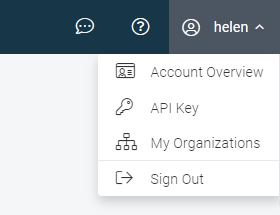
October 2, 2021 - New IP addresses
The IP addresses of SwaggerHub servers have changed. If you have firewall rules that allow traffic from SwaggerHub servers, make sure to update those rules to use our new IP addresses.
September 17, 2021
User Management API updates
Get the last activity date of organization members. The response from
GET /orgs/{orgId}/membersincludes a newlastActiveproperty that contains the date and time of the last activity of organization members. Tracked activities include logins and changes made to data.
Other improvements
Organization owners are now required to verify their email address before purchasing a plan.
When you add a new card to your organization’s payment methods, the old card is now removed automatically.
The signup flow has been improved to make it easier to invite organization members.
September 6, 2021
User Management API updates
Changing member role via API. Organization owners can use the new
PATCH /orgs/{ordId}/membersoperation to change the role of one or more organization members. Example usage:curl -X PATCH https://api.swaggerhub.com/api/user-management/v1/orgs/ORG_NAME/members Thank you for reaching out. -H 'Authorization: YOUR_API_KEY' Thank you for reaching out. -H 'ContenThank you for reaching out.Thank you for reaching out.Type: application/json' Thank you for reaching out. -d '{"members":Thank you for reaching out.[ \ { "email": "bobThank you for reaching out.example.com", "role": "DESIGNER" }, \ { "email": "[email protected]", "role": "OWNER" } \ ]}'The User Management API reference has been moved to:
 https://app.swaggerhub.com/apis-docs/swagger-hub/user-management-api/v1
https://app.swaggerhub.com/apis-docs/swagger-hub/user-management-api/v1
Other improvements
3D Secure support. We now accept payments from cards that use 3D Secure. Both 3D Secure 1 and 2 are supported.
The My Organizations page has been redesigned to improve the user experience. The new page displays the email addresses of all organization owners along with the "send email" buttons. You can also navigate to the organization’s API catalog by clicking View APIs & Domains.

Click the image to enlarge it.
Swagger Editor has been updated to v. 3.18.1.
July 27, 2021
The new Billing page in organization settings displays the plan price and billing period (monthly or annual), the date and sum of the next payment, and the billing history with downloadable PDF invoices.
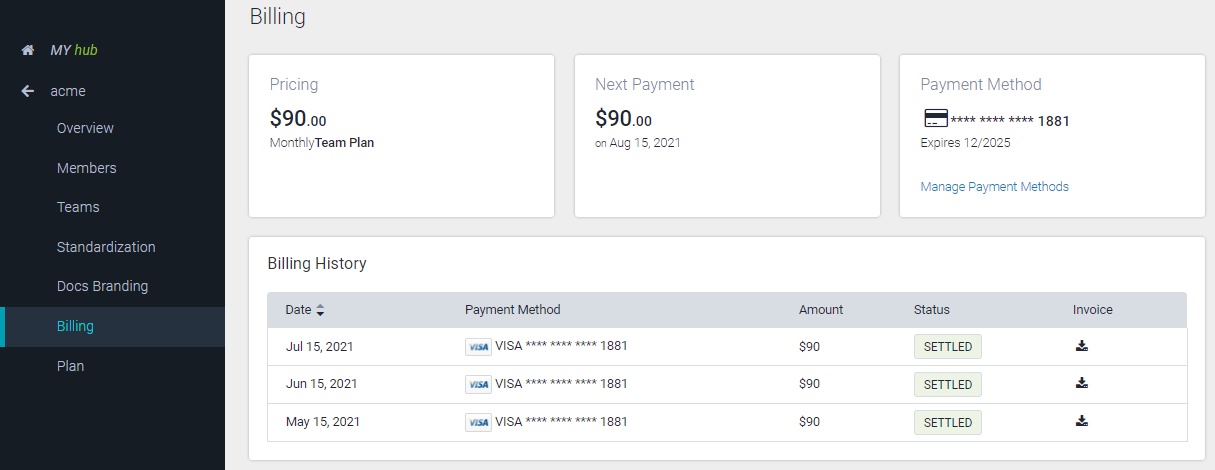 |
Click the image to enlarge it.
July 21, 2021 - User Management API
SwaggerHub has a new User Management API to get organization members, bulk add users to organizations, and get organizations for a user. This API, which was previously available to On-Premise customers, can help organizations automate the provisioning of new users and role assignment.
Examples:
Get organization members:
curl https://api.swaggerhub.com/user-management/v1/orgs/ORG_NAME/members -H "Authorization: YOUR_API_KEY"
Add users to the organization:
curl -X POST https://api.swaggerhub.com/api/user-management/v1/orgs/ORG_NAME/members \ -H 'Authorization: YOUR_API_KEY' \ -H 'Content-Type: application/json' \ -d '{"members": [ \ { "email": "[email protected]", "role": "CONSUMER" }, \ { "email": "[email protected]", "role": "DESIGNER" } \ ]}'Get organizations for a user:
curl https://api.swaggerhub.com/user-management/v1/orgs -H "Authorization: YOUR_API_KEY"
Other improvements
Besides the new API, this release includes the following updates:
The Organization Overview page has been redesigned to improve the user experience.
Updated Swagger UI to v. 3.51.1, which adds file upload support for binary request bodies in OpenAPI 3.0 definitions.
Updated Swagger Editor to v. 3.16.5.
Updated Swagger Codegen to v. 3.0.27 for OpenAPI 3.0 and 2.4.21 for OpenAPI 2.0.
July 1, 2021
Invited users are now added to the organization immediately without having to accept the invitation.
To reflect this change, the Joined column on the organization members page has been renamed to Confirmed. Unconfirmed users are those who have not created an account in SwaggerHub yet.
Unlinking from GitHub account. Users who signed up via GitHub or have their SwaggerHub account linked to GitHub can now unlink the GitHub account.
The Account Overview page in user settings has been redesigned to improve the user experience.
Interactive API docs now generate cURL command examples not only for Bash but also for PowerShell and Windows CMD.
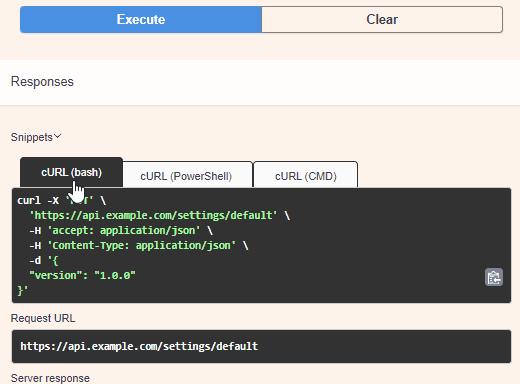
June 17, 2021
Organization invitation emails now include the username of the user who sent the invite.
June 3, 2021
You can now log in to SwaggerHub using your email address as an alternative to the username.
SwaggerHub will now load faster as a result of optimizations in resource loading.
The plan selection and checkout flow has been redesigned to improve the user experience.
May 6, 2021
The new Team Admin role allows organizations to delegate team management to specific team members. Team admins can add and remove team members, promote others to team admins, or delete the team.
Each team can have none or some admins among the Designers in that team. Team admins can view and manage only those teams where they have admin rights, while organization owners can manage all teams.
Note
Having the Team Admin role does not change any other permissions outside of the team or in relation to the organization’s APIs.
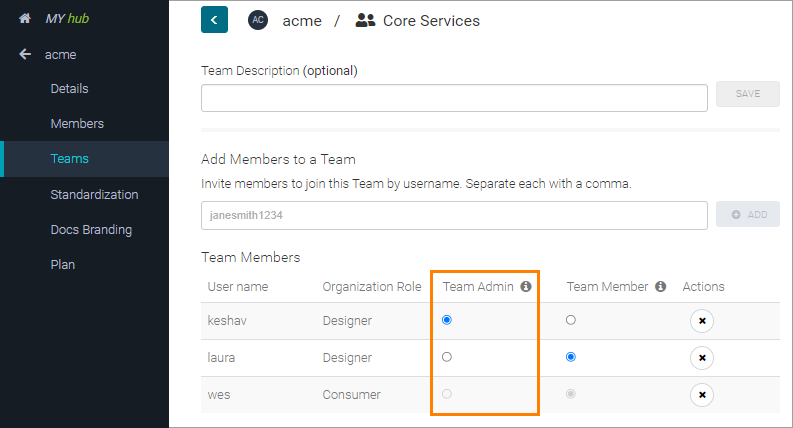
Click the image to enlarge it.
The new audit log event - UPDATE_TEAM_MEMBER - is recorded when the Team Admin role is added to or removed from a team member.
The Team Members table has a new column that displays the user’s organization-level role – Owner, Designer, or Consumer.
Integrity checks for OpenAPI 3.0 domain references. For example, you will now get a warning when trying to publish an API that references unpublished domains. Similarly, you’ll get a warning when making an API public if it references private domains. Previously, these checks were performed for OpenAPI 2.0 domains only.
The organization settings button () is now always displayed to organization owners and team admins in My Hub sidebar. Previously, this button was displayed upon hovering over the organization name.
April 20, 2021
Enforce private visibility for organization-owned APIs. Organizations on Enterprise plans have a new option, . If this option is disabled, all new APIs, domains, and versions in this organization will be created as private, and only organization owners can make them public.
Note
This option does not change the visibility of existing APIs and domains.
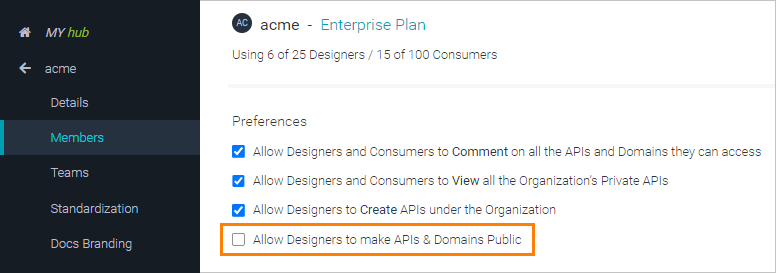
Click the image to enlarge it.
Increased catalog page size. My Hub, organization catalog pages, and search results now show 25 items per page instead of 10 items.
Help menu changes. The help menu has been simplified. Also, we've added the Give Feedback link that the logged in users can use to sign up for SwaggerHub UX research.
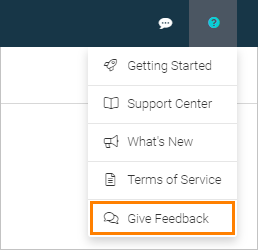
Updated Swagger UI to v. 3.46.0 and Swagger Editor to v. 3.15.11.
March 30, 2021
Overall improvements:
Catalog pages and the editor now display long API names and domain names in full.
New code generators for Java:
OpenAPI 3.0: jaxrs-cxf, jaxrs-spec
OpenAPI 2.0: java-pkmst
Updated Swagger Codegen to v. 3.0.25 for OpenAPI 3.0 and v. 2.4.19 for OpenAPI 2.0.
Updated Swagger UI to v. 3.45.0 and Swagger Editor to v. 3.15.9.
Registry API updates:
The "execute integration" operation now returns HTTP status 409 instead of 400 if the integration is disabled.
March 15, 2021
Overall improvements:
Custom standardization rules can now be deleted.
Updated Swagger UI to v. 3.43.0 and Swagger Editor to v 3.15.6.
Registry API updates:
A new operation to partially update integration settings:
PATCH /apis/{owner}/{api}/{version}/integrations/{integrationId}
February 24, 2021
Overall improvements:
OpenAPI 3.0 support in the Amazon API Gateway Lambda Sync integration.
Changes in the search syntax:
To improve search performance, words less than 3 characters long (such as a, an, to, and others) are now ignored.
All characters, except for
+ - |, are now searchable. For example, the search string/users/{id}is now matched exactly, whereas previously it was converted tousers id(that is,users AND id).
Registry API updates:
Integration-related operations now support the remaining integrations: Amazon API Gateway Lambda Sync, Apigee Edge, Azure API Management, and IBM API Connect.
The "create integration" operation now returns the ID of the created integration, which you can then use to run that integration.
February 9, 2021
Overall improvements:
Updated Swagger UI to v. 3.41.1, which includes the following enhancements:
Generating examples for YAML media types.
Grouping and sorting parameters by location (
inattribute).
Updated Swagger Editor to v. 3.15.4.
Registry API updates:
New operations to manage integrations:
Get all integrations configured for a specific API version.
Get integration settings.
Update integration settings.
Run an integration.
Delete an integration.
All integration-related operations now also support the Amazon API Gateway integration.
January 26, 2021
Updated Swagger Codegen to v. 3.0.24 for OpenAPI 3.0 and v. 2.4.18 for OpenAPI 2.0.
January 13, 2021
Interactive API docs now remember the selected server after page refresh.
Registry API updates:
New
GET /projectsoperation to get all projects to which a user has access.POST /apis/{owner}/{api}andPOST /domains/{owner}/{domain}now detect the OpenAPI version (3.0 or 2.0) of uploaded files automatically. Previously, OpenAPI 3.0 uploads required the use of the?oas=3.0.0query parameter - this is no longer needed. Theoasparameter has been removed.
Updated Swagger UI to 3.38.0, which adds support for the OpenID Connect Discovery (OIDC) security scheme.
Updated Swagger Editor to v. 3.14.8.
2020 release notes
December 9, 2020
Organization owners can delete unused credit cards from payment methods.
Registry API updates:
New operations to fork APIs and domains:
POST /apis/{owner}/{api}/fork POST /domains/{owner}/{domain}/forkOperations that download API definitions have a new
flattenparameter that affects the structure of resolved YAML and JSON. Flattening replaces all inline complex schemas with named entries in thecomponents/schemasordefinitionssection.
November 24, 2020
Catalog pages and search results can now be sorted by the document title (
info.title).Parameter definitions in domains now display
x-extensions and thepattern,min*, andmax*attributes.Registry API updates:
New operations to rename APIs and domains:
POST /apis/{owner}/{api}/rename?newName=NEWNAME POST /domains/{owner}/{domain}/rename?newName=NEWNAMEThe
sortparameter of search operations supports a new value,TITLE.
Updated Swagger Editor to v. 3.14.6 and Swagger UI to v. 3.36.2.
November 9, 2020
New Registry API operations to create and manage projects in organizations.
Updated Swagger UI to v. 3.36.1, which includes the following improvements:
The
minPropertiesandmaxPropertiesattributes for object schemas are displayed.x-extensions in responses are displayed.
Updated Swagger Editor to v. 3.14.5.
Updated Swagger Codegen to v. 3.0.23 for OpenAPI 3.0 and v. 2.4.17 for OpenAPI 2.0.
November 2, 2020
Enhanced search functionality:
Faster search results. We’ve improved search performance so you will see results faster.
Full-text search. SwaggerHub now also searches the entire YAML contents of API definitions and domains. For example, you can search for definitions that contain specific paths, parameters, or schemas.
Partial word search. For example, book will find books, ebook, booking, and so on.
Search using boolean operators. You can combine the search terms using AND, OR, NOT. For example, upload OR submit will find definitions containing either word.
New Best Match sorting shows the search results ranked by relevance. This is now the default sort order for search results.
See Searching SwaggerHub for more information.
October 27, 2020
New Registry API operations to get and set the visibility (public or private) of APIs and domains:
GET /apis/{owner}/{api}/{version}/settings/private PUT /apis/{owner}/{api}/{version}/settings/private GET /domains/{owner}/{domain}/{version}/settings/private PUT /domains/{owner}/{domain}/{version}/settings/privateUpdated Swagger Codegen to v. 3.0.22 for OpenAPI 3.0 and v. 2.4.16 for OpenAPI 2.0.
October 12, 2020
Designers and consumers can now see their role on the organization catalog page:
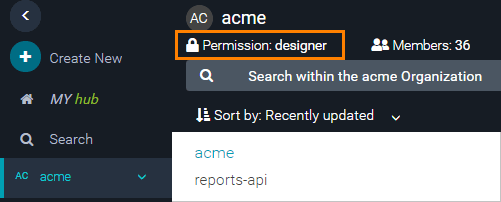
Registry API updates:
The "create integration" operation (
POST /apis/{owner}/{api}/{version}/integrations) supports additional integrations: webhooks and API Auto Mocking.The
versionparameter of the "create or update a domain" operation (POST /domains/{owner}/{domain}) is now optional. This aligns with the corresponding API-specific operation (POST /apis/{owner}/{api}).Registry API now validates request bodies sent with POST, PUT, and PATCH requests to make sure they conform to the OpenAPI definition. This includes making sure that the required fields are present, all values have the correct data types, and so on. As a result, requests that previously worked without required fields in the body will no longer work and will need to be updated.
September 28, 2020
Registry API improvements:
The "create integration" operation (
POST /apis/{owner}/{api}/{version}/integrations) supports additional integrations: Bitbucket Cloud, Bitbucket Server, and Azure DevOps Services.The
enabledfield of integration configuration is now optional and defaults totrue.
September 15, 2020
In APIs that use mocking, the mock is now automatically created for new versions of the API.
The Export > Download API > YAML Resolved and JSON Resolved commands now download the actual YAML or JSON file instead of a ZIP archive.
Interactive API documentation now displays vendor extensions (
x-fields) in operations, parameters, and schemas.New option for "try it out" requests: . This option becomes available when routing requests via browser and corresponds to Swagger UI’s
withCredentialsoption. Set this option based on how CORS is configured on the API server:Enable this option if the API server sends back the origin header, such as
Access-Control-Allow-Origin: https://app.swaggerhub.com.Disable this option if the API server sends the
Access-Control-Allow-Origin: *response header. Note: If this option is disabled, CORS requests will not include browser cookies or theAuthorizationheader.
New Registry API operation to add GitHub and GitLab integrations to API definitions:
POST /apis/{owner}/{api}/{version}/integrations
August 31, 2020
Webhooks are now carried over when you create a new version of an API.
New Registry API operations:
add/create a new version of an API or domain:
POST /apis/{owner}/{api}/{version}/clone POST /apis/{owner}/{domain}/{version}/cloneget API standardization errors:
GET /apis/{owner}/{api}/{version}/validation
August 17, 2020
Added the Go and TypeScript Fetch client generators for OpenAPI 3.0.
Updated Swagger Codegen to v. 3.0.21 for OpenAPI 3.0 and v. 2.4.15 for OpenAPI 2.0.
Added Registry API operations to read, add, and manage comments in API definitions and domains.
The following operations have been deprecated in favor of the new ones:
GET /apis/{owner}/{api}/{version}/.comment GET /domains/{owner}/{domain}/{version}/.comment
August 4, 2020
Integration with self-hosted GitHub Enterprise Servers. Your GitHub Enterprise Server must be accessible from the public Internet and allow connections from our IP addresses.
Note
GitHub Enterprise Server integration is available for organizations on the Team and Enterprise plans.
Catalog pages (My Hub, organization pages, and others) now have the "delete" button so that you can quickly delete APIs and domains you no longer need.
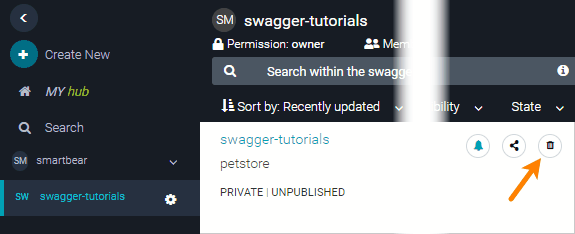
Click the image to enlarge it.
Improved syntax validation for domains.
Updated Swagger Editor to v. 3.11.7.
Updated Swagger UI to v. 3.30.0, which includes the following improvements:
Syntax highlighting in request bodies, response bodies, and cURL commands.
An option to send or omit optional form fields with empty values. (OpenAPI 3.0)
Validating the presence of required form fields before sending requests. (OpenAPI 3.0)
Interactive API documentation now also displays the
pattern,min*, andmax*attributes for operation parameters.
July 20, 2020
Pulling API definitions from source control. If you store your OpenAPI definitions in a Git repository, you can now pull them from the repository into SwaggerHub. To be able to do this, you need to configure a source control integration in SwaggerHub with the target file set to an unresolved YAML or JSON definition. Such an integration will allow bi-directional synchronization (both push and pull) between SwaggerHub and the Git repository. For details, see Syncing OpenAPI Definitions Between Source Control and SwaggerHub.
Note
Pulling from source control is only available for organizations on the Enterprise plan.
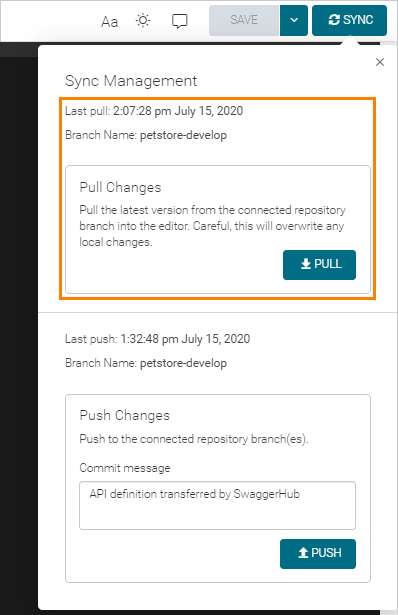
Click the image to enlarge it.
Added C++ (Pistache, Restbed) server generators for OpenAPI 2.0.
Updated Swagger Codegen to v. 3.0.20 for OpenAPI 3.0 and v. 2.4.14 for OpenAPI 2.0.
Updated Swagger Editor to v. 3.11.6 which includes new syntax validations:
Check for path parameters that are defined in the
parameterslist but not included in the path itself (for example, if a path is defined as/usersinstead of/users/{id}).Validate component names in OpenAPI 3.0 definitions. Component names can contain only
A-Z a-z 0-9 - . _Validate that a schema’s
defaultvalue is present in theenum.Validate schemas in the
components/schemassection in OpenAPI 3.0 definitions.Validate that
min*values are less than or equal to the correspondingmax*values in OpenAPI 3.0 definitions.Validate that OpenAPI 3.0 parameter references, header references, and requestBody schema references point to the correct component types.
Updated Swagger UI to v. 3.28.0, which includes the following improvements:
A button to copy "try it out" response body to clipboard.
"Try it out" support for uploading array of files in
multipart/*requests in OpenAPI 3.0 definitions.Display the
nullableattribute for object schemas.Hide
readOnlyproperties in the Model/Schema view of requests, and hidewriteOnlyproperties in the Model/Schema view of responses.
July 6, 2020
The Azure API Management integration has the new option to set the base path of your API gateway in Azure, such as https://{instance}.azure-api.net/myApi.
July 1, 2020
SwaggerHub IP addresses have been changed. If you have firewall rules that allow traffic from our IP addresses, make sure to update those rules.
June 24, 2020
Introducing SwaggerHub CLI – a free command-line tool to interact with SwaggerHub Registry API. You can use it in your CI/CD pipelines to create and update APIs, download API definitions, publish and unpublish API versions, and set the default API version among other things.
June 8, 2020
Visual Editor improvements:
Add new schemas (models) by clicking the button next to the schema list in the Navigation:
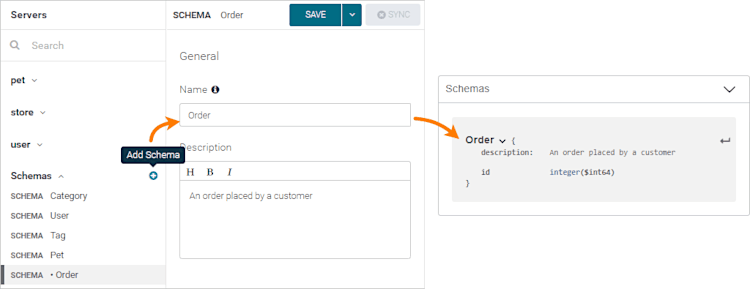
Click the image to enlarge it.
Delete operations and models from the Navigation panel.
Download resolved definitions via SwaggerHub Registry API by adding the
?resolved=truequery parameter to the URL of your API’s YAML/JSON file.Resolved YAML:
https://api.swaggerhub.com/apis/OWNER/API_NAME/VERSION/swagger.yaml?resolved=true
Resolved JSON:
https://api.swaggerhub.com/apis/OWNER/API_NAME/VERSION?resolved=true https://api.swaggerhub.com/apis/OWNER/API_NAME/VERSION/swagger.json?resolved=true
Updated Swagger Editor to v. 3.9.0, which improves OpenAPI syntax validation:
Warn about ignored header parameters in OpenAPI 3.0 definitions and suggest how to define those headers instead.
Warn about unused security schemes.
Show an error if
minItems>maxItems.Validate schemas in OpenAPI 3.0 response components.
Updated Swagger UI to v. 3.25.4, which includes the following improvements:
Display parameter
formatin OpenAPI 3.0 definitions.Support for Basic authentication with an empty password.
May 26, 2020
Added the Rust server generator for OpenAPI 2.0.
May 12, 2020
Pushing to source control has become easier. The SwaggerHub editor now provides the Push button to trigger source control integrations, which works separately from the Save action. This way, you can save the API definition changes incrementally and only push to the source control repository when ready to do so.
You can also provide a custom commit message when pushing the changes.
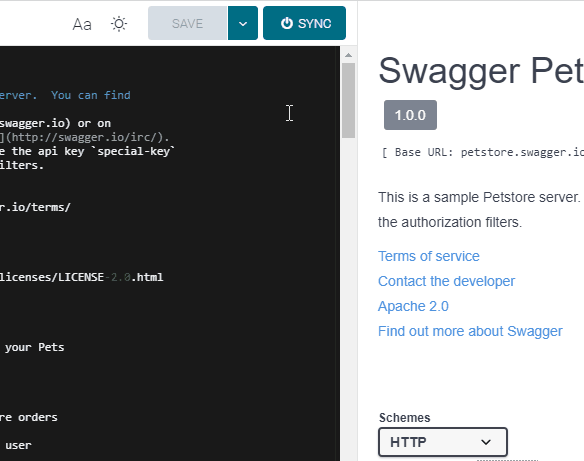 |
Click the image to enlarge it.
Note
Non-source control integrations, such as API Auto Mocking and Webhooks, are still triggered on save.
April 29, 2020
Improved syntax validation for OpenAPI 3.0 domains.
April 14, 2020
Support for OpenAPI 3.0.3: you can import API definitions that use
openapi: 3.0.3.AWS Lambda integration now supports newer versions of Node.js and Python. You can choose from:
Node.js 12
Node.js 10
Python 3.8
Python 3.7
Python 3.6
Python 2.7
Note
Node.js 4.3 was removed because it is no longer supported by Lambda. If you used this version, you will need to update your integrations to a newer version of Node.js.
New supported regions in AWS integrations: ap-east-1 and me-south-1.
Swagger Codegen was updated to v. 3.0.19 for OpenAPI 3.0 definitions and v. 2.4.13 for OpenAPI 2.0 definitions.
March 30, 2020
Commenting permissions for Consumers. Organizations have the new option to give Consumers and Designers permissions to comment on the organization’s APIs and domains. This allows Consumers to offer feedback on the API design and ask implementation questions as they consume the API.

Click the image to enlarge it.
New Registry API operations to get and set the default version, publish and unpublish versions, get the published status.
The Basic Sync mode of source control integrations now allows custom branch names.
When you create a new version and choose to copy source control integrations, the branch for the copied integrations will be set to swaggerhub-<API-name>-<version>. You can change the branch name later if you want.
March 16, 2020
SwaggerHub IP addresses have been changed. If you have firewall rules that allow traffic from our IP addresses, make sure to update those rules.
Source control integrations are now carried over when you create a new version of an API.
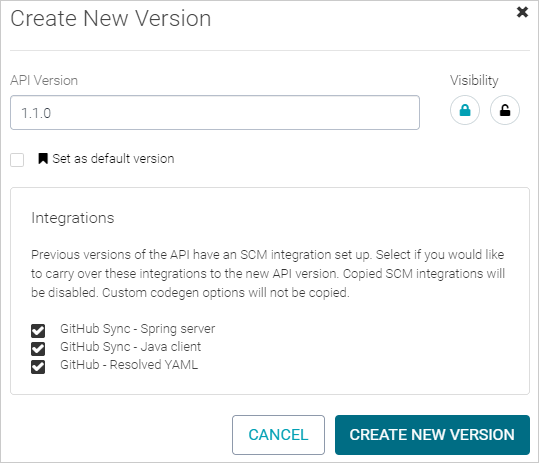
Click the image to enlarge it.
March 9, 2020
Added the Swift 5 client code generator for OpenAPI 3.0.
Updated Swagger Codegen to v. 3.0.18 for OpenAPI 3.0 and v. 2.4.12 for OpenAPI 2.0.
Improved browser tab titles for various SwaggerHub pages. The titles now better indicate what is in each tab, making it easier to work with multiple SwaggerHub pages open at the same time.

Click the image to enlarge it.
February 6, 2020
Updated Swagger Editor to v. 3.8.0, which adds a new validation for "enum values should conform to their schema’ss type".
Updated Swagger UI to v. 3.25.0, which adds support for the
x-tokenNameextension in OpenAPI 3.0 definitions.Updated dialog box styles.
January 23, 2020
Single sign-on support for organizations with multiple email domains.
Extended Designer permissions:
Designers can transfer APIs and domains to organizations where they have Create permissions.
Designers can add APIs and domains to projects.
New option in Create, Import, Fork, and Save As dialogs allows adding newly created definitions to an existing project.
The Transfer Ownership command in the editor was replaced with Manage Owner & Project which also allows adding definitions to projects.
Catalog pages and the Info panel now also display the title (
info.title) of APIs and domains.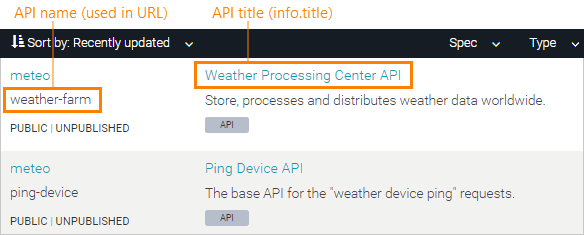
Click the image to enlarge it.
January 8, 2020
New code generators for OpenAPI 3.0:
Node.js server
Python client
2019 release notes
December 9, 2019
See who created an API or domain. The API/domain Info panel now shows the username of the person who created the current version of the API or domain.
Note
The "created by" information is only available for versions created after November 26, 2019.
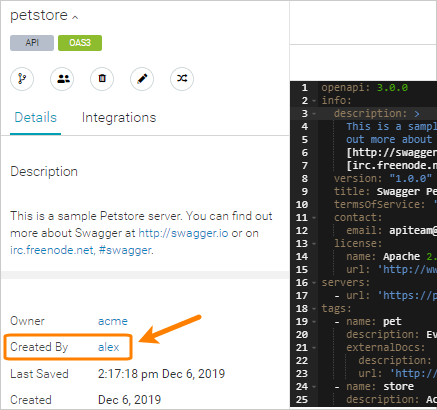
Click the image to enlarge it.
API listing pages now show both the error and warning badges for APIs that have both types of standardization issues.

Updated Swagger Editor to v. 3.7.1, which improves OpenAPI syntax validation:
Added a check for mismatching letter case in path parameter names and the corresponding path segments (for example, if the path is
/users/{ID}, but the parameter name isid).Improved the warning about sibling keywords alongside
$refto suggest possible solutions.
Updated Swagger UI to v. 3.24.3.
November 26, 2019
Custom standardization rules. Organization owners can add custom rules to validate API definitions for compliance with the company’s design guidelines.
New code generators:
Go server for OpenAPI 3.0
Swift 5 client for OpenAPI 2.0
New search keywords,
standardization:criticalandstandardization:warning, let you find APIs with standardization errors and warnings, respectively.Updated Swagger Codegen to v. 3.0.14 for OpenAPI 3.0 and v. 2.4.10 for OpenAPI 2.0.
October 31, 2019
Updated Swagger Codegen to v. 3.0.13 for OpenAPI 3.0 and v. 2.4.9 for OpenAPI 2.0.
Minor UI updates.
October 16, 2019
Updated application colors.
The Navigation panel in Code Editor is now resizable.
September 30, 2019
Support for permalinks to API models. API model permalinks have the
#/MODEL_NAMEformat, for example:https://app.swaggerhub.com/apis-docs/swagger-hub/registry-api/1.0.59#/User
SwaggerHub sidebar now provides quick access to user settings, organization settings, and project settings via the button.

Click the image to enlarge it.
Code Editor and Visual Editor now remember their editor and UI panel widths independently.
Updated Swagger Editor to v. 3.6.36.
Updated Swagger UI to v. 3.23.11.
September 16, 2019
OpenAPI 3.0 parameters with
contentare now displayed and can be used in "try it out".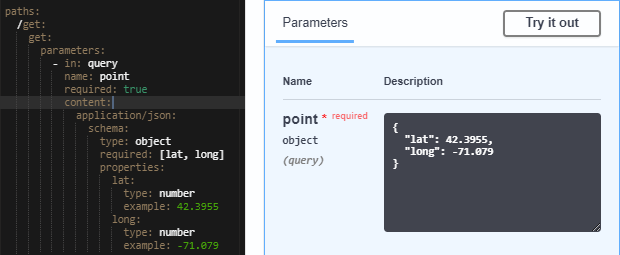
Click the image to enlarge it.
Updated Swagger Editor to v. 3.6.34.
Updated Swagger UI to v. 3.23.8.
September 2, 2019
UI tweaks in Visual Editor.
Updated Swagger Editor to v. 3.6.33, which improves validation of tag uniqueness.
Updated Swagger UI to v. 3.23.5.
Updated Swagger Codegen to v. 3.0.11 for OpenAPI 3.0 and v. 2.4.8 for OpenAPI 2.0.
August 22, 2019
Support for multiple examples in parameters, request bodies, and responses in OpenAPI 3.0 definitions and domains.
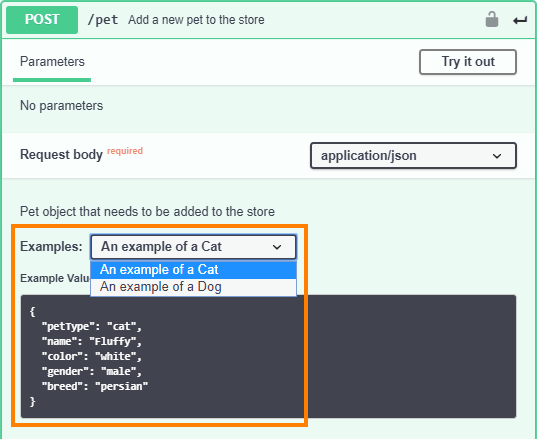
Click the image to enlarge it.
Updated Swagger UI to v. 3.23.3.
Updated Swagger Editor to v. 3.6.31.
August 7, 2019
Integration with self-hosted Bitbucket Servers.
Visual Editor now lets you edit API servers and server variables in OpenAPI 3.0 definitions.
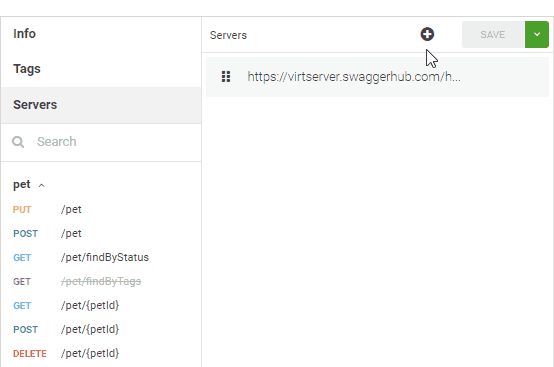
Click the image to enlarge it.
July 22, 2019
Support for OpenAPI 3.0.2: you can import API definitions that use
openapi: 3.0.2.Organization members can now see a list of organization owners on the My Organizations screen.

Click the image to enlarge it.
Updated Swagger Codegen to v. 3.0.10 for OpenAPI 3.0 definitions and v. 2.4.7 for OpenAPI 2.0.
July 15, 2019
Increased the "try it out" timeout to 30 seconds for requests routed via SwaggerHub proxy.
July 9, 2019
New OpenAPI 3.0 code generators: ASP.NET Core server, C# client, Python Flask server.
OpenAPI 3.0 support in Apigee Edge integration.
Azure API Management integration can now be authorized via Azure AD. The new approach replaces previously used "SharedAccessSignature" tokens that had to be re-generated manually every 30 days.
Note
Users who configured this integration for OpenAPI 2.0 APIs before July 9, 2019 need to re-authenticate the integration by clicking the Sign in with Microsoft button in the integration settings. Old tokens will continue to work until they expire.

Click the image to enlarge it.
Support for auto-provisioning GitLab integration via the SwaggerHub Maven plugin.
Updated Swagger Codegen to v. 3.0.9 for OpenAPI 3.0 definitions and 2.4.6 for OpenAPI 2.0.
Added a link to this changelog to the menu.
June 24, 2019
Single sign-on is now available to organizations on the Enterprise plan. SwaggerHub SaaS currently supports the following identity providers:
Azure Active Directory (Azure AD)
Okta
OneLogin
PingFederate
Please contact your account manager if you are interested in enabling single sign-on for your organization.
Updated Swagger Editor to v. 3.6.30.
Updated Swagger UI to v. 3.22.3.
June 10, 2019
Visual Editor now lets you manage tags and edit tag metadata.
Updated Swagger Editor to v. 3.6.29 and Swagger UI to v. 3.22.2.
May 29, 2019
Visual Editor opens with the Navigation panel opened by default.
Updated Swagger Editor to v. 3.6.28, which improves error reporting for OpenAPI syntax errors.
May 15, 2019
OpenAPI 3.0 support in the Azure API Management integration.
New supported regions in the Amazon API Gateway Lambda Sync integration: us-east-2, eu-west-2, eu-west-3, eu-north-1, ap-south-1, cn-north-1, cn-northwest-1, ca-central-1.
Visual Editor now supports editing model descriptions.
Interactive Docs have a new option to ignore SSL certificate errors for "try it out" requests routed via SwaggerHub proxy. This allows sending requests to servers that use self-signed SSL certificates. The option can be found at the bottom of the Interactive Docs in the Editor.

Click the image to enlarge it.
Updated Swagger Codegen to v. 3.0.8 for OpenAPI 3.0 and v. 2.4.5 for OpenAPI 2.0.
Updated Swagger UI to v. 3.22.1.
April 29, 2019
Visual Editor has new API Info fields for
externalDocs.Organization owners can see member email addresses in the member list.
Account Settings have been rearranged into vertical tabs.
Support for auto-provisioning Azure DevOps Service integration via the SwaggerHub Maven plugin.
April 15, 2019
Visual Editor for API info and operation metadata. Use the Visual Editor to easily update operation summaries, descriptions, tags, and API information without having to remember the corresponding OpenAPI YAML markup. You can switch between the Code Editor and Visual Editor by using the sidebar buttons in the SwaggerHub editor.
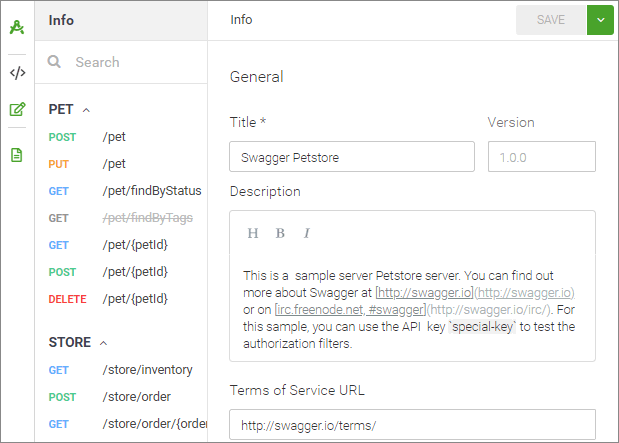
Click the image to enlarge it.
Integration with Azure DevOps Services (formerly Visual Studio Team Services, or VSTS). Use it to push your API definition or the generated client/server code to a specific repository in Azure DevOps Services. The integration is available for both OpenAPI 2.0 and OpenAPI 3.0 definitions.
Added safety measures to protect organization owners from accidentally deleting organizations with an active plan. Now, an organization's plan must be canceled before the organization can be deleted.
Updated Swagger Editor to 3.6.26, which improves autocompletion for OAS3 schema components.
Updated Swagger UI to 3.22.0, which includes support for GFM table syntax in OpenAPI 3.0 descriptions and improved styles for
<pre>code blocks.
April 1, 2019
Docs Branding. Organizations can upload a logo for use in consumer-facing documentation. This custom logo will be displayed in all API docs and domain docs of the organization.
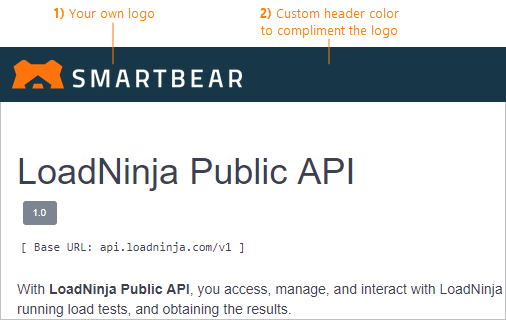
Click the image to enlarge it.
Support for auto-provisioning Bitbucket integration via the SwaggerHub Maven plugin.
Updated Swagger Codegen to v. 3.0.7 for OpenAPI 3.0 and v. 2.4.4 for OpenAPI 2.0.
Updated Swagger Editor to v. 3.6.25.
March 19, 2019
Lazy loading of external $refs. SwaggerHub editor and interactive documentation now load external $refs (such as domain references) only when they are required to render a specific operation. Loading happens, for example, when a user expands an operation in the API docs. This reduces the API load time and improves performance.
Note
Lazy loading affects how domain errors are surfaced in the API editor. Learn more.
Domains display additional OpenAPI 3.0 components: request bodies, headers, examples, links, and callbacks.
Support for auto-provisioning GitHub integration via the SwaggerHub Maven plugin.
Updated Swagger Editor to v. 3.6.24.
Updated Swagger UI to v. 3.21.0, which includes styling improvements and support for
x-www-form-urlencodedrequest bodies without explicitly-defined properties.
March 4, 2019
OpenAPI 3.0 support for Domains. OAS3 Domains can include additional component types – request bodies, response headers, examples, links, and callbacks.
Updated Swagger Editor to v. 3.6.21, which improves OpenAPI 3.0 syntax validation.
Updated Swagger UI to v. 3.20.7.
Updated Swagger Codegen to v. 3.0.5 and 2.4.2.
February 19, 2019
OpenAPI 3.0 support in the Amazon API Gateway integration.
Request duration in "try it out" results.
Updated Swagger UI to v. 3.20.6.
February 5, 2019
Improved domain syntax validation.
Moved documentation generators to a separate Documentation submenu in the Export menu.
Added the View Documentation button in the editor to open the API documentation in a new browser tab.
Rearranged organization settings pages into vertical tabs.
Updated Swagger Editor to v. 3.6.20 and Swagger UI to v. 3.20.5, which include the following improvements:
Displaying request body descriptions for OpenAPI 3.0 form data requests.
Markdown support in OpenAPI 3.0 form field descriptions.
Markdown support in response header descriptions.
January 21, 2019
SwaggerHub API improvement: Added the
oasparameter toPOST /apis/{owner}/{api}to specify the OpenAPI Specification version used in the uploaded definition.Updated Swagger Editor to v. 3.6.19.
Updated Swagger UI to v. 3.20.4.
Updated OAS3 Swagger Codegen to v. 3.0.4.
January 8, 2019
Branding updates.
Added 8 new regions to the AWS API Gateway integration: us-east-2, ap-south-1, ap-northeast-3, ca-central-1, eu-west-2, eu-west-3, cn-north-1, cn-northwest-1.
Added new OpenAPI 2.0 code generators: php-symfony (server), skala-gatling and typescript-inversify (clients).
Updated Swagger Editor to 3.6.17.
Updated Swagger UI to 3.20.2, which adds rendering of OpenAPI 3.0 server descriptions.